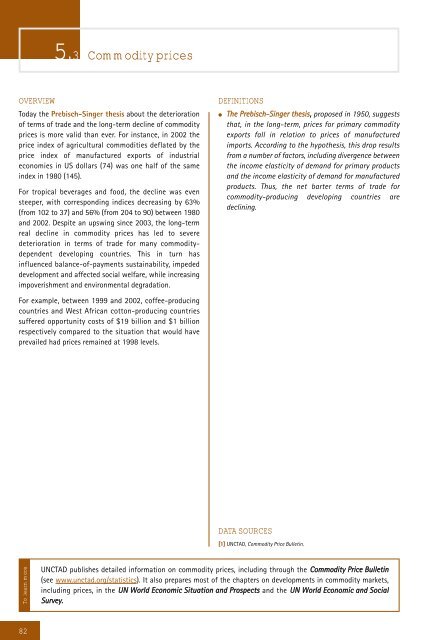Development and Globalization: - Unctad
Development and Globalization: - Unctad
Development and Globalization: - Unctad
Create successful ePaper yourself
Turn your PDF publications into a flip-book with our unique Google optimized e-Paper software.
OVERVIEW DEFINITIONS<br />
Today the Prebisch-Singer thesis about the deterioration<br />
of terms of trade <strong>and</strong> the long-term decline of commodity<br />
prices is more valid than ever. For instance, in 2002 the<br />
price index of agricultural commodities deflated by the<br />
price index of manufactured exports of industrial<br />
economies in US dollars (74) was one half of the same<br />
index in 1980 (145).<br />
For tropical beverages <strong>and</strong> food, the decline was even<br />
steeper, with corresponding indices decreasing by 63%<br />
(from 102 to 37) <strong>and</strong> 56% (from 204 to 90) between 1980<br />
<strong>and</strong> 2002. Despite an upswing since 2003, the long-term<br />
real decline in commodity prices has led to severe<br />
deterioration in terms of trade for many commoditydependent<br />
developing countries. This in turn has<br />
influenced balance-of-payments sustainability, impeded<br />
development <strong>and</strong> affected social welfare, while increasing<br />
impoverishment <strong>and</strong> environmental degradation.<br />
For example, between 1999 <strong>and</strong> 2002, coffee-producing<br />
countries <strong>and</strong> West African cotton-producing countries<br />
suffered opportunity costs of $19 billion <strong>and</strong> $1 billion<br />
respectively compared to the situation that would have<br />
prevailed had prices remained at 1998 levels.<br />
To learn more<br />
82<br />
5.3 Commodity prices<br />
● The Prebisch-Singer thesis, proposed in 1950, suggests<br />
that, in the long-term, prices for primary commodity<br />
exports fall in relation to prices of manufactured<br />
imports. According to the hypothesis, this drop results<br />
from a number of factors, including divergence between<br />
the income elasticity of dem<strong>and</strong> for primary products<br />
<strong>and</strong> the income elasticity of dem<strong>and</strong> for manufactured<br />
products. Thus, the net barter terms of trade for<br />
commodity-producing developing countries are<br />
declining.<br />
DATA SOURCES<br />
[1] UNCTAD, Commodity Price Bulletin.<br />
UNCTAD publishes detailed information on commodity prices, including through the Commodity Price Bulletin<br />
(see www.unctad.org/statistics). It also prepares most of the chapters on developments in commodity markets,<br />
including prices, in the UN World Economic Situation <strong>and</strong> Prospects <strong>and</strong> the UN World Economic <strong>and</strong> Social<br />
Survey.

















